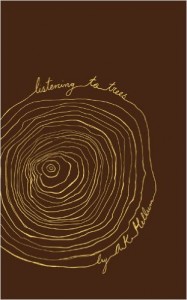Joy Williams is a writer I feel I should learn more about. This is an odd impulse for me. I never know much about the personal lives of the writers I love unless they happen to write memoir. I would rather focus on their writing than on them and let the writing stand on its own. I was listening to wonderful interview with John Irving recently on CBC in which he says “I have lived almost entirely in my imagination and have been free to do so because my own life has been staggeringly boring, much as I hoped it would be.” Writers should be allowed to be as dull as anyone else. Nevertheless, many of my writer friends study the lives and habits of writers they admire and even know about their agents and publishers. Last night a colleague told me that a casual email exchange I was in the midst of was with the agent of a group of particularly famous writers. I had no idea. Would knowing have altered what I said? I like to think not. I like to think I write and speak to everyone with the same measure of respect, but I admit I went back and reread the exchange with a new eye and winced over a typo. Oh dear. But I always wince over typos.
Anyway, back to Joy Williams. All of this is to make clear that I know very little about Joy Williams except that I  fell in love with her essays in Ill Nature: Rants and Reflections on Humanity and Other Animals. Kirkus calls it “savage, serious, hilarious, passionate, loving, and lyrical.” The book jacket says the writing has guts and passion, two things I admire in any writing. Her wit is sharp and scathing. As with A.K. Hellum’s Listening to Trees which I considered in my last post, the essays demand that we become more connected to the natural world. Perhaps I cannot help loving writing that dedicates itself to this theme.
fell in love with her essays in Ill Nature: Rants and Reflections on Humanity and Other Animals. Kirkus calls it “savage, serious, hilarious, passionate, loving, and lyrical.” The book jacket says the writing has guts and passion, two things I admire in any writing. Her wit is sharp and scathing. As with A.K. Hellum’s Listening to Trees which I considered in my last post, the essays demand that we become more connected to the natural world. Perhaps I cannot help loving writing that dedicates itself to this theme.
But it is more than that. Look at three opening sentences (and also take a minute to revel in the titles of these essays). From “Save the Whales, Screw the Shrimp”: “I don’t want to talk about me, of course, but it seems as though far too much attention has been lavished on you lately–that your greed and vanities and quest for self-fulfillment have been catered to far too much.” Of course, she is talking about herself. Saying she isn’t simply reminds us that she is. The shift to second person is brilliant, enabling a kind of dissociated state from which we can see and judge ourselves, and do so harshly. Such capacity for harsh judgement, having been built, stays with us far beyond the first essay when the second person is no longer in use. Williams is no enabler. There is no mollycoddling, no “We’re all doing what we can,” because we’re not. We’re doing nothing like what we can.
Look at this opening sentence from “Neverglades”: “That the Everglades still exists is a collective illusion shared by both those who care those who don’t.” I read this essay and other works by Williams about Florida before my own visit there. It altered my vision. I knew what I was seeing was a sad shadow of what used to be, a pathetic remnant of a once glorious world “so depleted of its original abundance and ecological function that it was no longer the Everglades at all. The gentle, natural, rain-driven sheet flow that once sustained it had been replaced by erratic pulses of water, which came in gorged polluted flushes, too much or too little, and always in the wrong season.” So much is conveyed in so few words–specific detail, the concrete comparison between past and the present, loss, even grief.
And from “Sharks and Suicide”: “There’s something out there waiting for us, and that’s the truth.” The essay captures our paranoia, our fear. “Wasps or abandoned refrigerators. Dehydration, myxedema, and the three-hundred-year-old elm on the curve. Explosions, and wrecks and electrocutions. Funny-tasting meat treats.” Zeroing in on sharks, she notes that sharks are “known to create concerns out of all proportion to the amount of injury or loss of life incurred statistically.” Sound familiar? Isn’t this sort of like what’s got us all taking our shoes off at the airport and having our hand lotion seized? But wait. This was published in 2001. Williams is not only scathing, savage, hilarious and all the other adjectives; she is prescient.
Is this about Williams or is it about the writing? Is my distinction artificial? Probably, especially when it comes to personal essays. It’s impossible not to learn about a writer who writes personal essays. I will move on to her novels now. I’m particularly interested in a work called The Changeling, a novel published in 1978 that went out of print and was finally reprinted thirty years later. The internet says that it got scuttled by a particularly bad review in the NYT but that it was ahead of its time. I’ll get back to you. I have an idea that it probably was.
Joy Williams. Ill Nature: Rants and Reflections on Humanity and Other Animals. New York: The Lyons Press. 2001.

